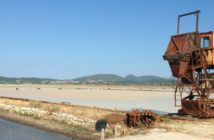In order to increase transparency and accountability in privatization process during 2014 we collected information on almost 180 privatized companies in Montenegro, organized public events and provided free legal assistance to workers to address possible corruption cases to relevant institutions.
Description of each privatization and all collected information, such as privatization contracts, investment plans and other available documents, are posted at a special section of our web site.
We organized info corners in nine municipalities, presenting citizens with devastating effects of privatization through photos of privatized companies. The info corners were attended by hundreds of citizens that provided us with further information on their companies.
We also organized a photo exhibition at our VIII National Anticorruption Conference to raise awareness among high level stakeholders from the government level and the international community.
At the Conference best practices in fighting corruption in privatization were presented by Head of the Department for Economic Crime and Corruption of the Ministry of the Interior of Croatia.
During 2014 we submitted an initiative to the Anticorruption Committee to discuss the failure of the prosecutor’s office on the criminal complaint of workers of 29 companies from the north of Montenegro, which was filed in 2012.
We also investigated several large privatizations and submitted criminal complaints to the prosecutor’s office.
MANS revealed documents related to privatization of the Aluminum Plant of Podgorica (KAP), the largest company in the country, showing that the company was sold for 28 million even though its assets were previously valued at 52 million euros.
We revealed that the Government provided the investor at very attractive tourist site Queen’s Beach located on the coast, with benefits that are contrary to the public interest, law and the Constitution.
We shared the findings with the public and MPs inviting them to reject verification of this contract in the Parliament of Montenegro.
Our investigative team discovered that the privatization of the Container Terminal in the country’s largest port, the Port of Bar, was conducted at the expense of public interest.
In the final round of negotiations with the Turkish partner, the Government of Montenegro waived the investor’s obligations to provide bank guarantees for the investment, while the investment plan was changed in favor of the new owner[2].
[1]Comments to the draft laws on Administrative Inspection, on Special State Prosecution, on the Constitutional Court and on Criminal Proceedings.
[2]The new investment plan defines for the investor only the obligation to invest into the equipment that can be removed and taken out after the concession period is over. In such manner, the investor rather invests in himself than into the Container Terminal Company.



